Relationship Spread #1
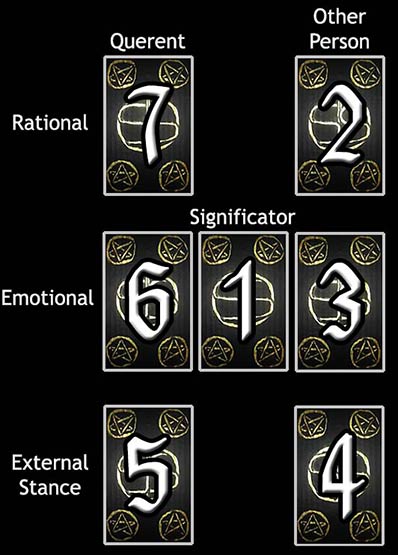
Difficulty: Easy
This tarot spread is easy to read, like a convenient chart. In this spread, court cards generally indicate actual people with the same characteristics. Knights (or corresponding princes, but not kings) and queens are meant to represent actual men and women in this tarot spread. Look for patterns in the cards as always.
Card #1 is the overall significator of the relationship. The two columns on either side of the significator characterise each individual's role in the relationship. The relationship does not have to be romantic. In fact, it could be a relationship between a person and a group, or even how two groups relate.
The top row, cards #7 & #2, is about the conscious thoughts of each person, or what they think about the relationship and likewise how they view their partner.
The middle row, cards #6 & #3, reveals the way each individual feels about the other. Emotional awareness corresponds to a person's unconscious thoughts that run deep, affecting a person in ways he or she is not fully aware of.
The bottom row, cards #5 & #4, represents the way each person behaves, in other words the stance taken regarding the relationship. The way a person acts may be genuine, but sometimes people are phony and manipulative, so it is best to weigh this card against the other person's cards to determine how they match up.
Your Relationship #1 Reading
| You | Other Person | ||
| Thought | 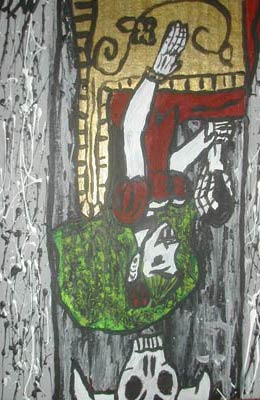 III. The Empress |
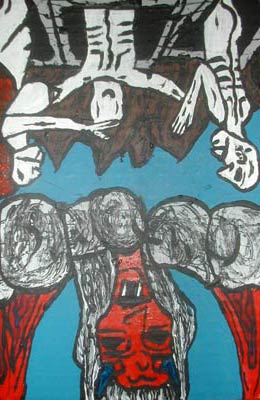 XX. Judgement |
|
| Emotion | 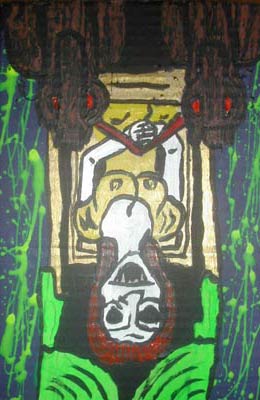 VII. The Chariot |
The Significator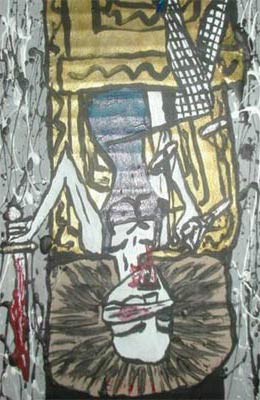 XI. Justice |
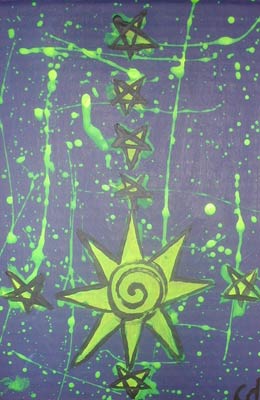 XVII. The Star |
| External Stance | 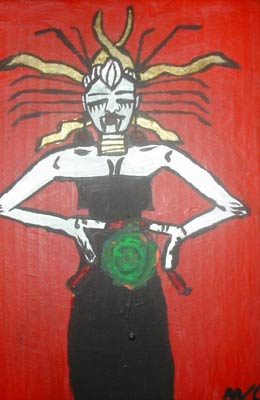 II. The Priestess |
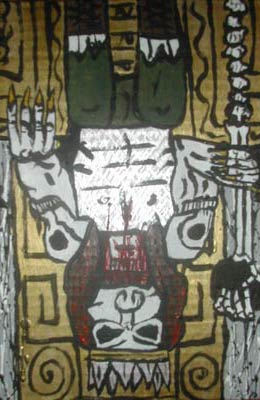 IV. The Emperor |

The Significator
XI. Justice
Reversed
Symbolism:
Justice is depicted as a pale, vampiric figure holding a pair of scales in one hand and a blood-stained sword in the other. One side of the scale holds a black feather, while the other holds a human heart, symbolizing the balance between moral accountability and emotional truth. Her blindfold is sheer, hinting at impartiality tempered with insight. Behind her, a blood-red curtain reveals fragmented mirrors reflecting distorted truths.
Meaning:
Justice embodies fairness, truth, and accountability. She calls for honesty and objectivity in your actions and decisions, ensuring that you consider all perspectives before rendering judgment. This card often signals the need to weigh your choices carefully and to take responsibility for the consequences of past actions.
Reversed, Justice suggests imbalance, dishonesty, or unfair treatment. It may indicate a refusal to acknowledge the truth or an avoidance of accountability for your actions.
Keywords:
Reversed: Dishonesty, unfairness, imbalance, corruption, denial of truth, avoidance.

The Querent's Thoughts
III. The Empress
Reversed
Symbolism:
The Empress sits upon her throne, her presence commanding yet nurturing. She holds the Hand of Glory, a macabre artifact symbolizing her power to claim whatever she desires. Her surroundings are lush and fertile, with dark roses blooming amidst the decay—symbols of beauty and abundance arising from even the grimmest conditions. Her expression is one of calm authority, radiating life-giving energy.
Meaning:
The Empress represents creation, fertility, and the nurturing aspects of life. She signifies abundance and the ability to bring ideas, projects, or relationships to fruition. This card invites you to connect with your creative or maternal instincts and embrace the cycles of growth and renewal. It may also point to emotional or physical abundance and a celebration of life's pleasures.
Reversed, the Empress warns of stagnation, overbearing tendencies, or emotional imbalance. It may point to neglect, smothering, or difficulties in manifesting creativity.
Keywords:
Reversed: Stagnation, neglect, overbearing, creative block, emotional imbalance.

The Other Person's Thoughts
XX. Judgement
Reversed
Symbolism:
Judgment depicts a haunting scene of the dead rising from crypts bathed in an eerie, silvery glow. A vampire angel hovers above, blowing a trumpet, its sound visible as luminous, curling waves. The figures below lift their arms skyward, drawn by the call to awakening. A massive, ancient tree stands in the background, its roots tangled with bones, symbolizing the cyclical nature of life and death.
Meaning:
Judgment signifies renewal, self-assessment, and a call to rise above the past. It asks you to confront your actions, choices, and truths, encouraging accountability and forgiveness. This card often appears during moments of profound transition, marking the opportunity to shed old burdens and embrace a higher purpose.
Reversed, Judgment warns of self-doubt, avoidance, or fear of change. It suggests a resistance to growth or ignoring the need for reflection.
Keywords:
Reversed: Self-doubt, avoidance, fear of change, lack of reflection, denial, stagnation.

The Querent's Emotions
VII. The Chariot
Reversed
Symbolism:
The Chariot is a sinister yet majestic vehicle drawn by two spectral horses, one black and one white, representing opposing forces. A Nosferatu figure stands at its helm, cloaked in shadows, holding a whip of shadowy tendrils. The chariot races through a mist-laden nightscape, its wheels crushing fallen leaves and brittle bones, symbolizing the journey's sacrifices and challenges.
Meaning:
The Chariot signifies determination, control, and the will to overcome obstacles. It calls for focused effort and harnessing conflicting energies to achieve a goal. This card often appears when decisive action and self-discipline are needed to navigate a complex situation. It encourages you to take charge of your direction and steer with purpose.
Reversed, the Chariot warns of recklessness, a loss of direction, or being overwhelmed by opposing forces. It may also point to a lack of confidence or an inability to move forward.
Keywords:
Reversed: Lack of control, recklessness, stagnation, self-doubt, misdirection, failure to progress.

The Other Person's Emotions
XVII. The Star
Symbolism:
The Star depicts a luminous vampire bathing in a moonlit pool, her pale skin shimmering with starlight. She pours blood from a goblet into the water, symbolizing renewal and the cycle of life. Above her, a constellation forms the shape of a chalice, representing hope and inspiration. The night sky is clear, and the surrounding landscape, though desolate, begins to show signs of new growth.
Meaning:
The Star embodies hope, inspiration, and spiritual renewal. It encourages you to trust in the universe and your own inner light, even during challenging times. This card often appears after a period of struggle, signaling healing, clarity, and the promise of brighter days ahead.
Keywords:
Upright: Hope, inspiration, renewal, clarity, healing, optimism, spirituality, guidance.

The Querent's External Stance
II. The Priestess
Symbolism:
The High Priestess holds a luminous sphere of power close to her womb, symbolizing the nurturing of secrets and inner knowledge. She is cloaked in flowing robes of dark and silvery hues, blending shadow and light to represent duality and balance. Behind her, the faint outline of a moonlit landscape hints at the cycles of nature and the mysteries of the subconscious. Her gaze is serene yet penetrating, as though she sees through to the core of truth.
Meaning:
The High Priestess signifies intuition, hidden wisdom, and the power of stillness. She encourages introspection and the pursuit of knowledge that lies beneath the surface. This card often appears when it is time to listen to your inner voice and trust the subtle cues of your environment. It may suggest secrets yet to be revealed or a need to delve deeper into your own emotions and spirituality.
Keywords:
Upright: Intuition, mystery, inner wisdom, reflection, subconscious, patience, hidden truths.

The Other Person's External Stance
IV. The Emperor
Reversed
Symbolism:
The Emperor is a Nosferatu seated on a blood-soaked throne, gripping the Hand of Glory as his scepter of authority. His crimson cloak flows like a river of lifeblood, symbolizing his dominion over life and death. Behind him, a craggy fortress rises, representing stability and the structures of power. His stern, commanding gaze reinforces his role as a protector and enforcer of order.
Meaning:
The Emperor symbolizes authority, stability, and protection. He represents the need for structure and discipline to achieve goals and maintain order. As a figure of leadership, he encourages reason and conviction in decision-making. This card often indicates a time to take control of your environment or to rely on a strong, supportive figure for guidance.
Reversed, the Emperor warns of rigidity, tyranny, or a loss of control. It may signify struggles with authority, immaturity, or the misuse of power.
Keywords:
Reversed: Tyranny, rigidity, immaturity, chaos, rebellion, over-control.
